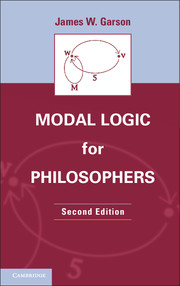Book contents
- Frontmatter
- Contents
- Preface to the Second Edition
- Preface
- Introduction: What Is Modal Logic?
- 1 The System K: A Foundation for Modal Logic
- 2 Extensions of K
- 3 Basic Concepts of Intensional Semantics
- 4 Trees for K
- 5 The Accessibility Relation
- 6 Trees for Extensions of K
- 7 Converting Trees to Proofs
- 8 Adequacy of Propositional Modal Logics
- 9 Completeness Using Canonical Models
- 10 Axioms and Their Corresponding Conditions on R
- 11 Relationships between the Modal Logics
- 12 Systems for Quantified Modal Logic
- 13 Semantics for Quantified Modal Logics
- 14 Trees for Quantified Modal Logic
- 15 The Adequacy of Quantified Modal Logics
- 16 Completeness of Quantified Modal Logics Using Trees
- 17 Completeness Using Canonical Models
- 18 Descriptions
- 19 Lambda Abstraction
- 20 Conditionals
- Answers to Selected Exercises
- Bibliography of Works Cited
- Index
19 - Lambda Abstraction
Published online by Cambridge University Press: 05 June 2014
- Frontmatter
- Contents
- Preface to the Second Edition
- Preface
- Introduction: What Is Modal Logic?
- 1 The System K: A Foundation for Modal Logic
- 2 Extensions of K
- 3 Basic Concepts of Intensional Semantics
- 4 Trees for K
- 5 The Accessibility Relation
- 6 Trees for Extensions of K
- 7 Converting Trees to Proofs
- 8 Adequacy of Propositional Modal Logics
- 9 Completeness Using Canonical Models
- 10 Axioms and Their Corresponding Conditions on R
- 11 Relationships between the Modal Logics
- 12 Systems for Quantified Modal Logic
- 13 Semantics for Quantified Modal Logics
- 14 Trees for Quantified Modal Logic
- 15 The Adequacy of Quantified Modal Logics
- 16 Completeness of Quantified Modal Logics Using Trees
- 17 Completeness Using Canonical Models
- 18 Descriptions
- 19 Lambda Abstraction
- 20 Conditionals
- Answers to Selected Exercises
- Bibliography of Works Cited
- Index
Summary
De Re and De Dicto
We have already encountered the de re – de dicto distinction at a number of points in this book. In this section, we will investigate the distinction more carefully, explain methods used to notate it, and develop quantified modal logics that are adequate for arguments involving the new notation.
Some of the best illustrations of the de re – de dicto distinction can be found among sentences of tense logic. For example, consider (S).
(S) The president was a crook.
This sentence is ambiguous. It might be taken to claim of the present president that he (Obama at the time this was written) used to be a crook. On the other hand, it might be read ‘At some time in the past the president (at that time) was a crook’. On this last reading, we are saying that the whole sentence (or dictum, in Latin) ‘the president is a crook’ was true at some past time. This is the de dicto reading of (S). Here both ‘the president’ and ‘is a crook’ are read in the past tense. We can represent this interpretation of (S) by applying the past tense operator P to the sentence ‘the president is a crook’, so that both ‘the president’ and ‘is a crook’ lie in its scope.
P(the president is a crook) de dicto reading of (S)
On the first reading of (S), we are saying a certain thing (in Latin, res) has a past tense property: of having been a crook. This is the de re reading of (S). Here we read ‘the president’ in the present tense, and ‘is a crook’ in the past tense. We can represent this reading by restricting the scope of the past tense operator P to the predicate ‘is a crook’.
the president P(is a crook) de re reading of (S)
The distinction between these two readings of (S) is a crucial one, for given that Obama never was a crook, and that Nixon was, the de dicto version of (S) is true, while the de re version is false.
- Type
- Chapter
- Information
- Modal Logic for Philosophers , pp. 407 - 429Publisher: Cambridge University PressPrint publication year: 2013



